“Hotspot in a box” runs Linux
May 4, 2009 — by Eric Brown — from the LinuxDevices Archive — 18 views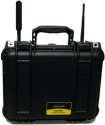 Proxicast is shipping a portable, battery-powered 3G and 802.11 a/b/g WiFi hotspot that runs embedded Linux. The Proxicast Cell-Pak is built around the company's LAN-Cell 2 mobile 3G cellular router, has a rugged, MIL-spec rated case, and targets first-responder applications, says the Pennsylvania-based company.
Proxicast is shipping a portable, battery-powered 3G and 802.11 a/b/g WiFi hotspot that runs embedded Linux. The Proxicast Cell-Pak is built around the company's LAN-Cell 2 mobile 3G cellular router, has a rugged, MIL-spec rated case, and targets first-responder applications, says the Pennsylvania-based company.
(Click for larger view of the Proxicast Cell-Pak)
The Cell-Pak is designed for emergency response, humanitarian assistance, disaster-relief, military, and other applications that require communications when wired communications infrastructure is unavailable, damaged, or overloaded, says Proxicast. It is said to be especially useful for first responders to hurricanes, floods, fires, earthquakes, or other disasters.
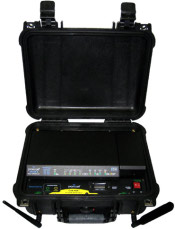 Proxicast Cell-Pak, open (Click to enlarge) |
Like many hybrid WiFi/3G products, the Cell-Pak automatically switches to whatever technology offers the highest bandwidth reliable service. The device is available with an integrated LAN Cell 2 3G cellular router, or it can be bought without the router as a battery power pack accessory for existing LAN-Cell 2 3G routers.
The Cell-Pak can connect to DSL, cable-modem, or other Ethernet-based networks, as well as to serial modem-based services including POTS lines and satellites, says the company. The LAN-Cell 2's PC-Card slot is said to support 3G modems from any cellular carrier worldwide. To boost signal strength for both WiFi and 3G, the Cell-Pak is equipped with high-gain antennas, as well as external antenna jacks.

Proxicast Cell-Pak open, with built-in LAN-Cell 2 console, shaded blue
(Click to enlarge)
The LAN-Cell 2 mobile 3G router (pictured below) enables a variety of devices to simultaneously share a single cellular data account for primary or backup connectivity, says the company. In addition to the 3G router, the LAN Cell 2 is equipped with an 802.11 a/b/g WiFi access point, and security features such as military-grade encryption (3DES/AES) and X.509 PKI certificate support. It also offers full VPN end-point capabilities. Connectivity features for both the Cell-Pak and the LAN-Cell 2 include four LAN Ethernet ports, a WAN Ethernet port, and a serial port.
The Cell-Pak operates on 12 VDC and can be powered by AC, DC, vehicle, generator, or solar power, recharging the battery while in operation. The Cell-Pak offers more than 12 hours of continuous battery operation per charge, says Proxicast. Equipped with an impact- and water-resistant 11.8 x 8.9 x 5.2-inch case, the device is said to provide a wide temperature range of -22 to to 140 deg. F. Optional “Card-Guard” extensions are said to protect external 3G modems.
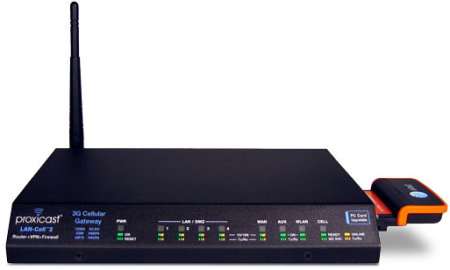
Lan-Cell 2 with 3G modem, but without optional, protective Card-Guard
(Click to enlarge)
According to a Proxicast spokesperson, the Cell-Pak (and presumably the LAN-Cell 2) run a “proprietary” version of Linux. However, the company is working on moving to an open Linux based implementation “sometime in the future,” said the spokesperson.
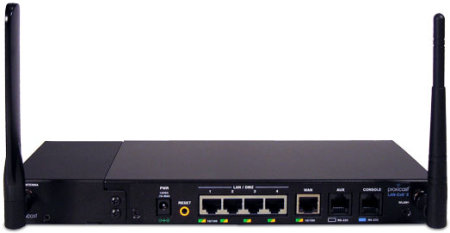
Rear view of Lan-Cell 2 with Card-Guard and external cellular antenna on left
(Click to enlarge)
Specifications listed for the Proxicast Cell-Pak include:
- Cellular — supports any standard 3G PC-Card modem (PCMCIA), including cards that support:
- EV-DO RevA and Rev0
- 1 x RTT
- HSUPA
- HSDPA
- UMTS
- EDGE
- GPRS
- WiFi — 802.11 a/b/g wireless access point with 64/152 bit WEP encryption
- Antennas — Internal and external SMA Cellular and RP-SMA WiFi antenna connectors
- Networking — 4 x 10/100 Ethernet ports (LAN switch) with LAN/DMZ/WLAN configurable zones; 1 x 10/100 Ethernet WAN port
- Serial — 1 x RS232 port for serial modem backup
- VPN — IPSec-based VPN client (DES, 3DES, AES encryption); supports up to 5 tunnels
- Security:
- Military-grade encryption (3DES/AES)
- X.509 PKI certificate support
- Stateful packet inspection firewall
- DoS protection
- Other features:
- Auto fail-over between cellular, WAN and dial-up ports with user selectable primary and fail-over ports
- Cell-Sentry cellular data budgeting system for managing cellular plan caps and overages
- Supports dynamic or static IP addresses
- Chassis:
- Rugged, molded Polypropylene Copolymer case
- Lockable lid; padded handle
- Impact resistant and crush-proof (4-foot drop test)
- Water and chemical-resistant; dust-proof
- MIL Spec MIL-C-4150J
- Def Stan 81-41/STANAG 4280
- ATA 300
- Ingress Protection (IP)
- Card-Guard PC Card cover and Card-Lock
- Power and battery:
- Auto-switching 120-240 VAC to 12 VDC
- Integrated Charge Controller Circuit (CCC) for solar, vehicle, or DC Sources
- Internal LAN-Cell power plug (2.1mm round jack)
- 12V/8-AH maintenance-free Sealed Lead Acid (SLA) battery with 12 VDC charging port (2.1 mm round jack)
- 10-segment LCD battery level meter
- Multiple charging status LEDs
- 12+ hours per charge; 3-hour recharge time
- Operating temperature — -22 to 140 deg. F (-30 to 60 deg. C)
- Dimensions — 11.8 x 8.9 x 5.2 inches (300 x 226 x 132mm)
- Weight — 16 lbs (7.3 kg) with LAN-Cell 2; 13 lbs (5.9 kg) without
- Operating system — embedded Linux
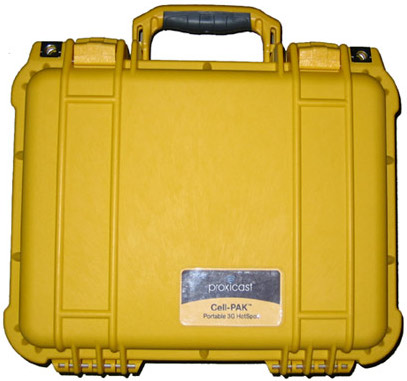
Cell-Pak in yellow
Availability
The Cell-Pak is available now at an undisclosed price, says Proxicast. More information may be found here. More on the LAN-Cell 2 may be found here.
This article was originally published on LinuxDevices.com and has been donated to the open source community by QuinStreet Inc. Please visit LinuxToday.com for up-to-date news and articles about Linux and open source.